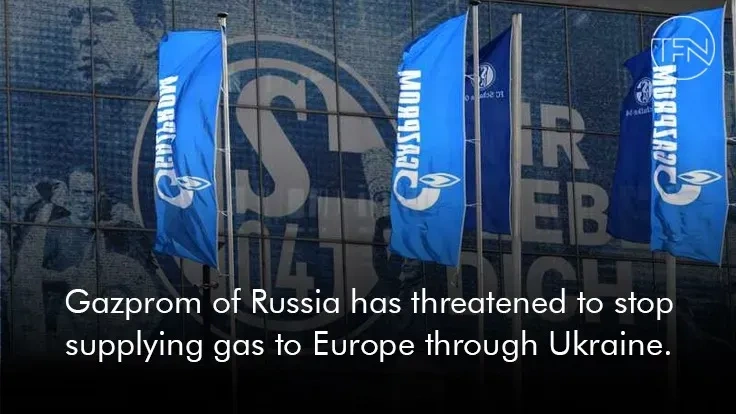
Due to concerns that the natural gas it is delivering to Moldova will not be used in the former Soviet republic, Russian energy giant Gazprom has threatened to cut supplies through the last pipeline connecting to Europe through Ukraine.
According to Gazprom, Moldovagaz, the gas firm of the poorest nation in Europe, paid for a portion of its gas flows in November by its contract. It further mentioned that this month, over 25 million cubic meters were given but not paid for.
In response to the "imbalance observed during the transit of gas to the Moldovan clients over Ukraine," the state-owned Russian business tweeted that Gazprom "would start limiting its gas deliveries" through Ukraine as of Monday.
Both Moldova and Ukraine retaliated against Gazprom, with Ukraine claiming that Moldova had "completely transferred" the supplies that Russia had sent over its territory.
“This is a gross falsification of the truth meant to back the decision to further restrict gas supply to European countries, which claims that Russia has previously used gas as a means of political pressure,” Olha Belkova from the Ukrainian Gas Transmission System Operator said.
This is the most recent escalation after Russia cut off the majority of natural gas supplies to Europe amid the conflict in Ukraine, a move that European officials have dubbed "energy blackmail" and that Gazprom has attributed to maintenance and payment problems.
A second pipeline continues to transport Russian gas to Turkey under the Black Sea in addition to the one that runs through Ukraine.
Any decreases in supply as winter approaches, when natural gas is required to heat homes, produce electricity, and power factories, could result in higher costs, which would further squeeze people and companies and fuel inflation. The natural gas shortage could get worse if the weather turns out to be colder than usual. Natural gas prices have dropped since their August peaks, and European countries have been able to fill their winter storage capacity.
An energy crisis in Moldova
Due to Russia's halving of its natural gas supply and Moscow's attacks on Ukraine's energy infrastructure, several cities in the former Soviet republic experienced extensive outages.
Moldova's energy systems from the Soviet era are still connected to Ukraine, so it was largely dependent on Russian electricity before the war. As a result, the missile barrages triggered an automated supply line shutdown, which briefly turned off the lights.
Due to the existing high cost of electricity and inflation, consumers in Moldova, a country with a population of around 2.6 million people, may find it difficult to pay their bills if more energy supplies are cut off.
The European Commission President Ursula von der Leyen recently met with the president of Moldova, Maia Sandu, to discuss energy assistance. Simone Tagliapietra, an expert on energy policy at the Bruegel think tank in Brussels, noted that leaders who visited Kyiv earlier in the war to show their support had their gas cut off later.
Tagliapietra speculated about Russia's possible plot. “It seems like a last-ditch effort on their behalf. Their supply of energy weapons is becoming low."
He claimed that pressuring the EU into mobilizing financial help for Moldova could be one of the goals.
A global relief meeting in Paris that was co-chaired by France, Germany, and Romania on Monday brought in more than $102 million to help Moldova. The EU also promised the nation aid earlier this month for 250 million euros, or roughly $256 million.
The energy crisis in Moldova, including Transnistria, a separatist area supported by Russia, "was not triggered by Chisinau, but by the unreasonable decisions of the Russian business Gazprom," according to a statement from the country's office of reintegration policy.
In a letter to the United Nations and the Organization for Security and Cooperation in Europe on Tuesday, the de facto authorities of Transnistria claimed that Moldova's pro-Western leaders are to blame for electricity shortages in the breakaway state. Moldova's statement was a response to those claims.
The statement from Moldova stated that the only way to end the situation was for Gazprom to resume supplying natural gas in the volumes specified by the current contract and that Transnistria's charges were intended "to mislead the public opinion and external partners."
Possibly setting the framework for a fresh crisis that could endanger the shaky balance we have thus far been able to preserve.
On the same day that Ukraine applied for membership in the EU, Moldova also did so.

